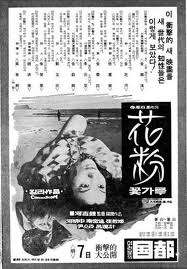Adventures in Classic Korean Cinema: POLLEN

Adventures in Classic Korean Cinema is a bi-weekly feature looking back at classic South Korean Cinema.
 My very first Korean film from the 1970s, which I saw during last year's Udine Far East Film Festival in the "Darkest Decade of Korean Cinema" retrospective curated by Darcy Paquet, was the debut of Ha Kil-jong, who would only produce a small body of work before his untimely death in 1979 at the tender age of 37. Ha pursued graduate studies in film directing from the University of California Los Angeles (UCLA). During his time in the States he made the short The Ritual of a Soldier, which won an award from MGM.
My very first Korean film from the 1970s, which I saw during last year's Udine Far East Film Festival in the "Darkest Decade of Korean Cinema" retrospective curated by Darcy Paquet, was the debut of Ha Kil-jong, who would only produce a small body of work before his untimely death in 1979 at the tender age of 37. Ha pursued graduate studies in film directing from the University of California Los Angeles (UCLA). During his time in the States he made the short The Ritual of a Soldier, which won an award from MGM.
He returned to Korea with a burden of expectation laid on his shoulders and was given free license to make his first film. His brash style and experimentation did much to revive a flagging industry but his fiercely social works did not win him many fans in high places. The March of Fools (1975), considered his crowning achievement (though it is rare and I have yet to see it), was heavily censored.
1972's Pollen (aka The Pollen of Flowers) is a dark film and, though the production values are not always of the highest standard, it is an infectious, inventive and often delirious work. It's also very difficult to categorize. A domestic melodrama to be sure but it's also a sort of psychedelic, horror erotica. Regardless of its classification, it's a fascinating film from a cineaste who was evidently a very keen cinephile, as it draws on a vast array of world cinema influences, including the works of Pasolini, Antonioni and Bergman.
Min-ja is a young girl who lives with her sister, the mistress of Hyeon-ma. With his new male secretary Dan-ju in tow, Hyeon-ma visits their 'Blue Mansion'. Min-ja runs away after being made fun of following her first period and Dan-ju is sent to bring her home. Thus begins a tempestuous affair that leads to disastrous consequences.
There is a great deal of repression and hypocrisy on display in the film and much of what unfolds is affected with a biting and mordant wit. The house where most of action takes place is called the Blue Mansion, an obvious reference to the building that houses Korea's head of state. In fact much of the film is informed by the politics of its day. The 1970s was a very dark decade for Korea, under the brutal and oppressive authoritarian regime of Park Chung-hee.
One of my favorite sequences is a party that takes place in the house. An intense and yet downbeat energy abounds on the lawn outside the house as well to do guests seem hellbent of their own gratification. They are in a trance, stuck to each other but vacantly staring off in silence as they amble to a pulsating and psychedelic funereal march. The editing is both languid and frantic as it, along with the piercing cinematography, highlight this macabre dance of the dead.
In its second half, the film plays a lot like Pasolini's Teorama (1968), in which a man (played by Terence Stamp) destroyed the fragile illusions of a bourgeois family by sleeping with everyone in a household. Dan-ju, imprisoned outside the house following his affair, becomes a sex slave for its female inhabitants. The characters in this film, particularly the zombified drones of the central party sequence and the vulturous creditors that sweep down towards the end, are purely out for their own gain.
Fiercely critical of the upper classes that feed on the lower ones and each other, Pollen is a vital work that carries on the torch Kim Ki-young light a decade earlier with The Housemaid (1960). Though not known outside of Korea, Ha's debut could easily stand among the classics of world cinema. For the moment it is a rare film that is hard to discover but I imagine it will become accessible before too much more time passes.



-thumb-630x260-39683.jpg)




